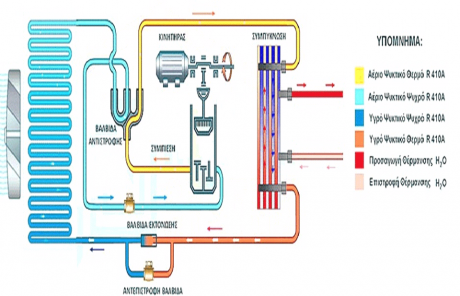What is it? What constitutes a heat pump?

The heat pump is a complete heating and cooling system in which there is the possibility of reversing the refrigeration cycle to the condenser to evaporator becomes and vice versa.
The heat pump consists of:
- The compressor
- The condenser
- The evaporator
- The expansion valve
- The four-way valve
- The control system
Advantages of heat pump
The heat pump should ensure the comfort of the traditional systems, without interventions on existing domestic premises, increasing investment costs. The factors influencing the choice of the machine is the maximum water temperature and the maximum power output. The compressor technology, the selection of refrigerants and individual components determines the degree of performance parameters with ambient temperatures and the water outlet.
Mild climates like Greece to promote the economic operation of the heat pump, while lower temperatures increase water savings.
- Energy savings: savings in operating costs of up to 4 times compared to fossil fuels.
- Environmental protection: Lowest CO2 emission up to 80% compared to fossil fuels.
- Installation – machinery space: Outdoor installation.
- Maintenance costs: As a common air conditioner.
- Reliability – Quality: High performance, comfort control, safe operation, full range of accessories and spare parts.
- Flexible interface applications: Install new or old buildings, wide range of applications (radiators, floor, fan coil, etc.).
- Intelligent management: Compensation system for economic operation during heating or cooling.
[clear]
